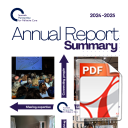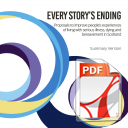SPPC Publications
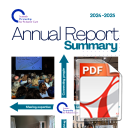
SPPC Annual Report - Summary 2024-25
A summary of SPPC's activity for the financial year April 2024-March 2025.
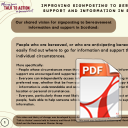
Bereavement signposting theory of change
This report shares a consensus vision and theory of change for improving signposting to bereavement information and support in Scotland.
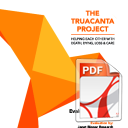
Truacanta Project Final Evaluation Report 2023
This report sets out key findings and reflections from the Truacanta Project, a project which took a community development approach to support communities in Scotland improve local experiences of death, dying, loss and care.
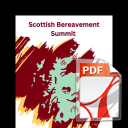
Bereavement Summit Final Report
This report presents the findings and recommendations from the Scottish Bereavement Summit. Published 28 June 2023

Summary Report - Bereavement Summit
This is a short 6-page summary report providing a brief overview of key issues raised at the Scottish Bereavement Summit.

Demystifying Death Week Reflectons: 2022
This paper provides and overview and reflection on activity relating to Demystifying Death Week 2022.

Truacanta Project Evaluation - Interim Report April 2021
Janet Biggar Research was commissioned along with Rebecca McFarlane Ltd to evaluate the Truacanta project. This interim report for The Scottish Partnership for Palliative Care presents their findings at the end of the first phase of the evaluation. A second phase will follow with a further, final report.

Every Story's Ending
'Every Story's Ending' explores what can be done in Scotland to improve people’s experiences of serious illness, dying and bereavement which: - sets out an ambition for what living with serious illness, dying and bereavement in Scotland could and should look like - explores what matters to people when they are seriously ill, dying or bereaved - explains why these issues are so important to so many people, and why change is needed - takes stock of recent progress, work underway and the current situation regarding living with serious illness, dying and bereavement - identifies key challenges - explores how to make change happen over the next 3-10 years - identifies priorities and recommends actions that will make a positive difference to experiences of living with serious illness, dying and bereavement in Scotland.

To Absent Friends 2018 Evaluation Report
This report summarises and reflects on activity that took place as part of the 2018 To Absent Friends Festival.

Good Death Week 2018 Overview of Activity
This report summarises and reflects on activity that took place as part of Good Death Week in May 2018.

A Road Less Lonely
A report looking at how to encourage more supportive attitudes and behaviours relating to death, dying and bereavement in Scotland. A Road Less Lonely, Moving forward with public health approaches to death, dying and bereavement in Scotland explores some of the different areas that can shape people’s experiences of death, dying and bereavement. It focuses particularly on: -Death education and bereavement support in schools. -Workplace culture and policies. -The role of communities. -The practicalities of planning ahead for deteriorating health and death. -Personal skills and knowledge relating to death, dying and bereavement. -Mass media campaigns. -Socio-economic disadvantage. -Funeral poverty. -Good Life, Good Death, Good Grief, Scotland’s public health palliative care alliance. This report highlights a wide range of projects and initiatives ongoing in Scotland and further afield that are relevant to improving people’s experiences of death, dying and bereavement. It illustrates that Scotland there is a huge amount of enthusiasm, skills, knowledge and resources relating to public health approaches to death, dying and bereavement. A Road Less Lonely also suggests a range of steps that could be taken to move forward this area of work, illustrating that relevant action can be taken by a range of different types of organisations, across a variety of domains.
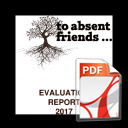
To Absent Friends 2017 Evaluation Report
This report summarises and reflects on activity that took place as part of the 2017 To Absent Friends Festival.
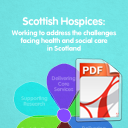
Scottish Hospices: Working to address the challenges facing health and social care in Scotland. Summary Report.
The Scottish Partnership for Palliative Care and all Scottish Independent Voluntary Hospices have worked together to publish a new report which explores the many ways in which Scottish Independent Voluntary Hospices support the Scottish health and social care system. Scottish Hospices: working to address the challenges facing health and social care in Scotland addresses questions such as: - What is a hospice? - Who benefits from hospices? - What services do hospices provide? - How do hospices support the wider health and social care system in Scotland? - How do hospices help address current challenges facing health and social care in Scotland? The report makes it clear that Scottish hospices have an essential role to play in improving care for individuals, families and communities in Scotland. By working closely with Integrated Joint Boards, hospices can bring leadership, expertise and patient-driven solutions to deliver greater value.
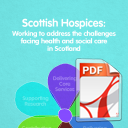
Scottish Hospices: Working to address the challenges facing health and social care in Scotland. Full Report.
The Scottish Partnership for Palliative Care and all Scottish Independent Voluntary Hospices have worked together to publish a new report which explores the many ways in which Scottish Independent Voluntary Hospices support the Scottish health and social care system. Scottish Hospices: working to address the challenges facing health and social care in Scotland addresses questions such as: - What is a hospice? - Who benefits from hospices? - What services do hospices provide? - How do hospices support the wider health and social care system in Scotland? - How do hospices help address current challenges facing health and social care in Scotland? The report makes it clear that Scottish hospices have an essential role to play in improving care for individuals, families and communities in Scotland. By working closely with Integrated Joint Boards, hospices can bring leadership, expertise and patient-driven solutions to deliver greater value.

TAF Activity Report and Evaluation 2015
A report and evaluation of activity that took place for the To Absent Friends Festival 2015.

Death Awareness Week Scotland 2016: Summary Report
A summary of activity in Scotland during Death Awareness Week Scotland 2016.

Grasping the Nettle
A position paper developed by the Scottish Partnership for Palliative Care (SPPC) to: - articulate the views and expertise of SPPC member organisations and other SPPC stakeholders; - support, enrich and inform the development of the forthcoming Scottish Government Strategic Framework for Action on Palliative and End of Life Care.

SAS/SPPC End of Life Care Policy (April 2014)
The End of Life Care Policy, developed jointly by the Scottish Ambulance Service (SAS) and the Scottish Partnership for Palliative Care, provides guidance for all SAS staff involved in caring and arranging transport for palliative care patients and training staff in their needs. The document includes information about DNACPR/CYPADM orders as well as palliative care algorithms for Ordering Authorities, Ambulance Despatch and Operational Ambulance Staff. Originally published in October 2010, the policy was last updated in April 2014.

Are we living and dying well yet?
On the 5th February 2014, Marie Curie Cancer Care and the Scottish Partnership for Palliative Care (SPPC) organised a seminar to discuss the future of palliative care, end of life care and all related issues. Professionals involved in palliative and end of life care from across the health, social care and voluntary sectors came together with MSPs. The aim was to discuss successes to date, challenges for the future, and to work together to find a consensus on how we move forward. In this short publication Marie Curie Cancer Care and the SPPC have reported on the key themes and issues raised in the discussions and set out recommendations which emerged from the event.
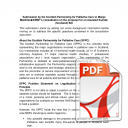
Submission by the Scottish Partnership for Palliative Care to Margo MacDonald MSP’s consultation on the proposal for an Assisted Suicide (Scotland) Bill (April 2012)
Following formal consultation with its membership the Partnership has now made a submission to Margo MacDonald's consultation on a proposal for an Assisted Suicide (Scotland) Bill. 44% of voting representatives responded to the Partnership's consultation and of these 98% supported the submission.

Reshaping Care Improvement Network Report of Practice Exchange (October 2011)
The Scottish Partnership for Palliative Care worked in collaboration with the Joint Improvement Team and a number of other national organisations to put on a Practice Exchange Event in October 2011. The event aimed to engage a wide range of primary, community and secondary care practitioners in Reshaping Care for Older People and exchange models of collaborative interdisciplinary practice with a particular focus on delivering integrated and co-ordinated clinical care to support frail older people to remain at home. ISBN: no ISBN

2011 Conference summary: Thinking ahead in palliative care
This year's conference took place at the Royal College of Physicians of Edinburgh on Thursday 6 October 2011. Around 220 people attended and preliminary evaluations indicate that the programme was very well received. A short summary of conference presentations and workshops is included in this document. Copies of the conference presentations and the posters displayed at the conference are availble on this website. ISBN: no ISBN
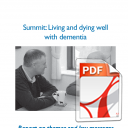
Summit: Living and dying well with dementia (March 2011)
Alzheimer Scotland, Edinburgh Napier University and the Scottish Partnership for Palliative Care (SPPC) organised a summit Living and Dying Well with Dementia, which took place on 4 March 2011. The event was funded by NHS Education for Scotland (NES), Edinburgh Napier University and the SPPC. The summit aimed to build on previous work by Alzheimer Scotland which looked at improving understanding of a palliative care approach to care for people with dementia among a wide range of health and social care staff and NHS Lothian (funded by The Big Lottery) which had a dual focus on supporting family carers and the assessment and management of distress and pain for people with a dementia. Included in the report are the key messages drawn from the Summit as well as the themes that emerged from the day, through group discussions, speaker presentations or question and answer sessions. ISBN: 978-0-9572326-0-0

A beginner’s guide to successful palliative care research (February 2011)
This document provides basic guidance for health and social care professionals on how to begin to engage in palliative care research. It is not intended to be a complete guide to conducting palliative care research, but is designed to help people to get started. It aims to assist those who have not had much previous experience in palliative care research to: * understand the research process * identify potentially useful ideas for research * utilise other people’s research * write a research proposal * gain research approval from appropriate bodies * source funding for palliative care research * undertake research while continuing their clinical role or secondment * write up research * disseminate research findings. ISBN: 978-095423969-5
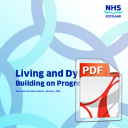
Living and Dying Well - Building on Progress (January 2011)
Two years on from the launch of Living and Dying Well: A national action plan for palliative and end of life care in Scotland in October 2008, there is widespread evidence that the cohesive national approach outlined in the document is well on the way to ensuring the provision of consistent and equitable palliative and end of life care for all people and their families across Scotland who need it. The achievements outlined in this document demonstrate the very substantial progress which has been made towards the equitable provision of high quality palliative and end of life care across Scotland for everyone, whenever and wherever they need it. Moreover, that progress has been made in a manner which is sustainable for the future. Although there is still some way to go before the full aims of Living and Dying Well reach fruition, the Scottish Government, NHS Boards, key stakeholders and individual practitioners across all sectors remain committed to the process which has begun. In the short term, governance and operational arrangements to ensure implementation of all of the actions in Living and Dying Well and Living and Dying Well: Building on Progress will continue through the Scottish Government, the National Advisory Group and the Executive Leads. In the longer term, clinical leadership and quality assurance will continue to develop within the NHS QIS integrated cycle of improvement in partnership with, NES and the Scottish Partnership for Palliative Care. ISBN: 978-0-7559-9860-9 (web only)

2010 Conference Report: Palliative care is everbody’s business
The Scottish Government continues to make palliative and end of life care a high priority. In the Scottish Parliament there is also increased interest in palliative care, a recent example being the Public Audit Committee’s request for evidence on improvement. Developments such as MSP Margo MacDonald’s End of Life Assistance (Scotland) Bill, Terry Pratchett’s Reith Lecture, and the Director of Public Prosecution’s publication of an assisted suicide policy have all been part of an increasing and ongoing public discourse about end of life issues. This new, higher profile brings with it new challenges, and through parallel workshop sessions the conference provided an opportunity to identify some of these challenges and think through and discuss their implications. Capturing both aspirations and realities in its title, and with a strong participative element, the conference set out to interest and stimulate delegates on the subject of palliative care being ‘everybody’s business’. ISBN: no ISBN
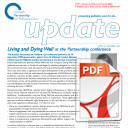
2009 Conference report: Palliative care: How can we make a difference?
This edition of the newsletter is devoted to the Partnership’s annual conference on 30 September 2009 , when over 200 delegates met at the Royal College of Physicians of Edinburgh to explore, with the help of a range of speakers and workshop leaders, the theme ‘Palliative care: How can we make a difference?. You will find detailed reports of the main presentations inside the newsletter. ISBN: no ISBN
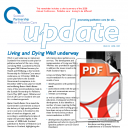
2008 Conference summary: Palliative care: daring to be different
The Partnership’s Annual Conference Palliative Care: daring to be different, held on 2 October 2008 at the Royal College of Physicians of Edinburgh, was a busy and enjoyable day which was highly evaluated by the great majority of delegates. As well as the launch by the Cabinet Secretary of Living and Dying Well a national action plan for palliative and end of life care in Scotland, delegates were able to hear from a full programme of interesting and informative speakers. ISBN: no ISBN

Living and Dying Well: a national action plan for palliative and end of life care in Scotland (September 2008)
Living and Dying Well, a national action plan for palliative and end of life care in Scotland, provides the focus and momentum to ensure the Scottish Government’s strategic priority to improve palliative and end of life care services becomes a practical reality and is applicable to all geographical areas of Scotland. Living and Dying Well is a plan to ensure that good palliative and end of life care is available for all patients and families who need it in a consistent, comprehensive, appropriate and equitable manner across all care settings in Scotland. It is intended for all health and social care policy makers, planners and practitioners, and is designed to produce achievable and measurable changes which will ensure quality improvement and enhance patient and carer experience. However, it does not yet have all the answers. Living and Dying Well identifies some changes which can be made in the short and medium term, and some which will take a little longer and will require further collaborative and developmental work, as well as additional input of time and resources. ISBN: 978-0-7559-5889-4

Living and dying with advanced heart failure: a palliative care approach (March 2008)
With a foreword by the Chief Medical Officer for Scotland, endorsed by the National Centre for Advanced Heart Failure, and produced following extensive consultation, this report describes the potentially extensive scope of palliative care in heart failure and makes many sensible and practical recommendations - the scale of their implementation being determined by fund holders. Inevitably, translating these recommendations into practice will mean making choices about where gains can be made most effectively and rewardingly for patients. Aiming primarily for making the best quality of life for those patients who are close to the end of their lives would be an excellent start. ISBN: 978-095423968-8

2007 Conference report: Active and holistic? ...planning for palliative care in 2027
Nearly 170 delegates gathered for the Annual Conference of the Scottish Partnership for Palliative Care at the Royal College of Physicians of Edinburgh on Thursday 30 August 2007 for an exciting and challenging glimpse of possible futures for palliative care. Speakers had been asked to consider a vision of palliative care in the future in a range of care settings and to examine some of the processes, partnerships, policies and initiatives which will be necessary to sustain and improve services. All rose to the challenge, and in a series of thought-provoking and inspiring presentations pointed to some of the potentially difficult decisions and adjustments that will have to be made in order for palliative care to remain both active and holistic in the year 2027. Dr Derek Doyle, OBE, Honorary President of the Scottish Partnership for Palliative Care, opened the conference by reminding delegates that uncertainty had always been part of the picture for palliative care. It was a myth to assume that pioneers, including Cicely Saunders, had had a clear plan at the outset for the development of palliative care services – in fact all were taken by surprise by unfolding events. He urged those present to draw strength from this background when facing the very real challenges implied by the conference agenda. ISBN: no ISBN

Palliative and end of life care in Scotland: the case for a cohesive approach (May 2007)
This report and recommendations, produced as a result of a widespread consultation by a short life working group of the Scottish Partnership for Palliative Care and submitted to the then Scottish Executive in May 2007, led to a commitment by the Scottish Government in Better Health, Better Care: Action Plan (December 2007) to implement the report’s recommendations and to the subsequent launch of the Scottish Government’s national action plan for palliative and end of life care in Scotland Living and Dying Well at the SPPC’s annual conference in October 2008. ISBN: no ISBN

A guide to using palliative care competence frameworks (March 2007)
This guidance was produced to support managers, teams and individuals in identifying appropriate palliative care competences for use within their organisation or workplace. The information contained within this document should assist individuals and organisations to use competences to support recruitment, workforce planning and development, role redesign and career progression, and help them consider the needs of individual practitioners as well as the skill mix required in teams. ISBN: 978-095423967-1

Joined up thinking, Joined up care: Report of the Scottish Partnership for Palliative Care Big Lottery Fund project (November 2006)
The population is ageing; more people are living with long-term conditions. Advances in medical knowledge and improvements in health services have increased life expectancy, but the inevitable cannot be prevented. Adaptations are required around the way people are cared for during their lifetime, and this includes the way people are cared for when they are dying. The Scottish Partnership for Palliative Care believes that this report provides a valuable opportunity for the views of service users, providers and planners throughout Scotland regarding access to palliative care for people with life-threatening conditions other than cancer to be heard. We hope that the information gathered will be of use to all concerned and that in its process and outcomes the project has helped to point the way to realistic and achievable ways of working towards equitable access to appropriate palliative care for all. ISBN: 978-095423966-4
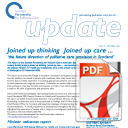
2006 Conference report: Joined up thinking, Joined up care ...
The report of the Scottish Partnership for Palliative Care’s three-year Big Lottery funded project, Joined up thinking Joined up care … was launched by the Deputy Minister for Health and Community Care at the annual conference in Edinburgh on 22 November 2006. The report summarises the findings of extensive consultation throughout Scotland into the palliative care needs of people with conditions other than cancer, the barriers they currently experience in accessing appropriate palliative care, and ways in which these barriers might be overcome. It identifies increased collaboration and joint working as a key way forward, and proposes a model of care which emphasises a need for the skills of generalists and specialists alike. Almost 300 conference delegates representing health and social care sectors heard Lewis Macdonald MSP, Deputy Minister for Health and Community Care, welcome the report on behalf of the Scottish Executive. Patricia Wallace, Director of the Partnership, outlined the work of the project and its findings, and Dr Harry Burns, Chief Medical Officer for Scotland, addressed the challenges of implementing the recommendations. A varied programme of presentations throughout the day highlighted the experience of people with a range of non-malignant conditions and focussed on the main themes identified. ISBN: no ISBN

Making good care better: National practice statements for general palliative care in adult care homes in Scotland (May 2006) reprinted March 2008 and March 2009
The Care Commission recognises these new national palliative care practice statements as best practice when inspecting the quality of palliative care delivered in care homes. They will also be taken into account when registering any new care home and when investigating complaints or carrying out enforcement activity in adult care homes. The palliative care practice statements set out what people can expect from their current or future care home in order to meet their palliative care needs. They will, equally importantly, provide a resource for care home owners and managers to help them deliver palliative care to both an acceptable and achievable level. (The Care Commission has since become the Care Inspectorate.) ISBN: 0-9542396-5-2

National care standards for hospice care (revised September 2005)
Scottish Ministers set up the National Care Standards Committee (NCSC) to develop national standards. The NCSC carried out this work with the help of a number of working groups. These groups included people who use the services, their families and carers, along with staff, professional associations, regulators from health and social care, local authorities and independent health providers. Many others were involved in the consultation process. As a result, the standards have been developed from the point of view of the person who uses the service. They describe what each individual person can expect from the service provider. They focus on the quality of life that the person using the service actually experiences and they apply to people using all aspects of hospice’s services (in-patient care, day care, home care and out-patient care) unless the standard is inappropriate for the aspect. ISBN: 0 7559 4745 2
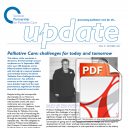
2005 Conference report: Palliative care: challenges for today and tomorrow
This edition of the newsletter is devoted to the Partnership’s annual conference on 14 September 2005, when over 200 delegates met at Hilton Dunblane Hydro to explore, with the help of a range of speakers and workshop leaders, the theme ‘Palliative care: challenges for today and tomorrow’. You will find a summary on the cover pages and more detailed reports of the main presentations, together for the first time with a pictorial record, inside. Despite lacking the incomparable chairmanship of our Honorary President, Dr Derek Doyle, who was unfortunately unwell, this year’s conference was once again an undoubted success. Professor Frank Clark, Chairman of the Scottish Partnership for Palliative Care, ably took over the role of introducing the guest speakers and guiding delegates through an interesting, informative and enjoyable day. We were delighted to welcome Professor Julia Addington-Hall, Professor Vivienne Nathanson and Dr Marie Fallon as our guest speakers, and grateful to them for their detailed and thoughtful presentations, each of which did indeed outline many of the present and future challenges for palliative care. ISBN: no ISBN

2004 Conference report: Palliative Care: moving beyond the comfort zone
The Partnership’s annual conference at the Hilton Dunblane Hydro on 8 September attracted over 200 delegates willing to be challenged by new thoughts and to consider entering new realms of professional discomfort. A range of speakers and workshops under the excellent and thoughtprovoking chairmanship of Honorary President Dr Derek Doyle delivered a programme which provided ample opportunities for both. Unfortunately Professor Julia Addington-Hall, one of the keynote speakers and leader of the most popular workshop session, was taken ill on the morning of the event and was unable to participate, but despite this disappointment, the majority of delegates enjoyed an interesting and successful day. ISBN: no ISBN

Public Awareness of Palliative Care (December 2003)
This report outlines the findings of the first Scottish national survey of public awareness, knowledge and understanding of palliative care. The survey aimed to establish the current level of knowledge of palliative care, establish what factors contribute to knowledge of palliative care, and explore attitudes towards palliative care. Results indicated that the general public’s grasp of, and desire for the delivery of, a holistic concept of end of life care which embraces the physical, practical, social, spiritual and emotional needs of individuals and families may be considerably greater than had been previously realised. The research also indicated that a majority of people would like to see issues of death and dying more openly addressed in Scottish society, and that a majority of people would like information about palliative care services to be more generally available. ISBN: 0-9542396-4-4

2003 Conference report: Beyond the randomised trial: evidence and effectiveness in palliative care (September 2003)
The Scottish Partnership for Palliative Care’s Annual Conference in Dunblane on 10 September 2003 attracted 190 delegates from Scotland and the UK. Those attending were given the opportunity, through a series of plenary and workshop sessions, to consider the many issues arising from the conference theme of evidence and effectiveness in palliative care. A series of keynote speakers outlined some of the issues for research and evidence-gathering in palliative care and workshop sessions were held in both the morning and afternoon to give delegates a further opportunity to learn and share experiences. ISBN: 0-9542396-3-6

Palliative Care in Community Hospitals in Scotland: A Framework for Good Practice (November 2003)
This publication is significant because it is very important for patients; patients with palliative care needs, whatever their diagnosis, need the reassurance of knowing that health and social care professionals place the highest priority on ensuring that patients – with conditions we all fear, and with symptoms we all fear will not be controlled – are comfortable and in control during their illness. This document goes some way to acknowledge the work done by all the professionals and health care support workers in the community hospitals across Scotland which function as palliative care units for the locality. This is a statement of quality upon which we need to build. ISBN: no ISBN
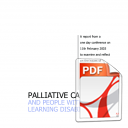
Palliative Care and People with Learning Disablities (February 2003)
This event was the first major conference in Scotland to provide a platform for discussion of the palliative care needs of people with learning disabilities. Over 120 people attended it. Delegates with expertise and interest in palliative care joined delegates with expertise and interest in supporting people with learning disabilities to discuss their palliative care needs and the response of services. Participants came from all over Scotland; from health and social care settings. They came to hear speakers of national and international repute reflect on and share experience and knowledge and to develop an agenda for improvement and change. The conference was organised by Common Knowledge, the Scottish Partnership for Palliative Care and St Columba’s Hospice. Dr Donald Macaskill, Head of Training and Learning with Scottish Human Services Trust, chaired the day. ISBN: 1 899751 23 8

2002 Conference report: Rethinking palliative care: an opportunity to explore new challenges (November 2002)
The Scottish Partnership for Palliative Care’s Annual Conference in Stirling on 6 November 2002 gave over 140 delegates the opportunity to explore new challenges by “Rethinking Palliative Care” in a series of plenary and workshop sessions throughout the day. The conference was evaluated highly, with 98% of responses indicating that the content was relevant or very relevant to delegates’ work and 96% indicating that the conference would affect delegates’ thinking or work practice. Individual comments included widespread appreciation for Honorary Vice President Dr Derek Doyle’s skills and style as chairman, and for the educational, networking and thought-provoking value of the day. ISBN: 0-9542396-2-8

Clinical Standards for Specialist Palliative Care (September 2001, reprinted June 2002)
This document introduces the Clinical Standards Board for Scotland’s (CSBS) Clinical Standards for Specialist Palliative Care. These standards were developed in partnership with the Scottish Partnership for Palliative Care and apply to specific elements of the service. They cover the following areas: * Access to Specialist Palliative Care Services * Key Elements of Specialist Palliative Care * Managing People and Resources * Professional Education * Inter-professional Communication * Communication with Patients/Carers * Therapeutic Interventions * Patient Activity. The standards will be used to assess performance in these areas in hospital, community and hospice settings throughout Scotland where specialist palliative care services are provided. (CSBS had since become NHS Quality Improvement Scotland and subsequently Healthcare Improvement Scotland) ISBN: 1-84404-066-6

An Evaluation of a Patient Held Record in Cancer and Palliative Care (June 2006)
This report is the result of a research study commissioned by a Joint Working Party on Patient Held Records set up in the light of widespread interest in the use of Patient Held Records in palliative and cancer care. A randomised control trial was undertaken in central Scotland by the Department of Nursing Research at the University of ?Newcastle. This report presents the results of that trial which were first published in the Journal of Palliative Medicine, Vol 16, No 3, 2002. ISBN: 0-9542396-1-X

Palliative Care for Young People aged 13-24 Years (September 2001)
This report provides a guide to what can and should be done to help the ‘in-between’ group of those facing the transition from childhood to adulthood. The opportunity was taken to involve a relevant reference group of young people in the production of this report. The needs of young people are very different from those of children and adults, and special thought needs to be given as to how to provide for these. This report is not prescriptive about how services should be provided but sets out principles, which all members of the caring team can adapt to local needs. ISBN: 1 898447 06 3

2001 Conference report: Palliative care for all - responding to need not diagnosis (November 2001)
The Scottish Partnership Agency for Palliative and Cancer Care (SPA) held its 10th anniversary conference “Palliative care for all – Responding to need not diagnosis” at Inchyra Grange, Polmont on 21 November 2001. At its AGM on the same day, the SPA changed its name to the Scottish Partnership for Palliative Care to reflect its commitment to the new wider agenda of palliative care for all. The conference was attended by 185 delegates from NHS boards and trusts, universities, hospices and voluntary organisations. The delegates included representatives from a wide a range of professions and disciplines including medicine, nursing, chaplaincy, occupational therapy, pharmacy and social work. They were working not only in palliative care but in children’s services, geriatrics, dementia services, neurology, oncology, primary care and psychiatry. Delegates evaluated the day highly, rating it as informative, interesting and extremely helpful in exploring the issues around palliative care for people with conditions other than cancer. ISBN: 0-9542396-0-1

2000 Conference report: Sharing good practice (December 2000)
The Scottish Partnership Agency held a one-day conference on the theme of Sharing Good Practice in Stirling on 6 December 2000. The conference was attended by 130 delegates from across Scotland including health professionals and managers from health boards, NHS acute and primary care trusts, hospices and other voluntary organisations involved in palliative and cancer care. Delegates evaluated the conference highly for being informative and relevant to their own practice and the Scottish Partnership Agency hopes this report will encourage the continued sharing of good practice. ISBN: no ISBN

Positive Partnerships - Palliative Care for Adults with Severe Mental Health Problems (May 2000)
This report addresses the palliative care needs of adults with pre-existing severe mental health problems who develop a life threatening illness and require palliative care, and those of adults with dementia. It aims to raise awareness in both the palliative care and mental health arenas of the needs of these patients, facilitate discussion and partnership between the different agencies involved, provide guidance about the way forward, and highlight priorities for research. ISBN: 1-898915-21-0 ISSN: 1351-9441

A framework for the operation of Managed Clinical Networks in Palliative Care (February 2000)
This report of a Working Party set up by the Scottish Partnership Agency for Palliative and Cancer Care suggests a Framework for the operation of Managed Clinical Networks in Palliative Care in Scotland. The report sets out the benefits which the Working Party believe it should be possible to achieve for patients, carers and health professionals through the establishment of Managed Clinical Networks in Palliative Care. It describes the aims and characteristics of MCNs in Palliative Care and makes recommendations about membership and structure, allowing some flexibility so that Networks can be targeted to suit local needs and circumstances. ISBN: no ISBN
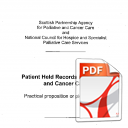
Patient Held Records in Palliative and Cancer Care: Practical proposition or pie in the sky? (October 1998)
Report of a conference held on 02 October 1998 in Newcastle upon Tyne, organised by the Joint Working Party on Patient Held Records of the National Council for Hospice and Specialist Palliative Care Services and the Scottish Partnership Agency for Palliative and Cancer Care. ISBN: 0-9524864-7-4

Registration of Nursing Homes for Palliative Care - implications of the Scottish Core Standards (August 1998)
This report was intended to be read in conjunction with the Core Standards for Nursing Homes registered to provide palliative care (issued by the Scottish Office in April 1998 under cover of NHS MEL (98)21). The report aims to explore further the place of nursing homes in the total spectrum of palliative care and also looks at the implications of the new standards for nursing homes themselves, for health boards as the registering authority and for all the other services with which nursing homes registered for palliative care must develop good links if they are to meet the standards expected. ISBN: 0-9524864-6-6

Reaching Out: Specialist Palliative Care for Adults with Non-Malignant Diseases (June 1998)
With a foreword by Baroness Jay of Paddington, Minister of State, Department of Health and Sam Galbraith MP, Minister for Health, the Scottish Office, this document examines the palliative care needs of patients dying from progressive non-malignant diseases and those of patients living with chronic non-malignant diseases. It aims primarily to promote discussions and action amongst and between: providers of specialist palliative care health service commissioners providers of education to health:, social and pastoral care professionals and; health professionals caring for people with a wide range of life-threatening diseases. ISBN: no ISBN

Palliative Cancer Care - the integration of Palliative Care with Cancer Services (August 1996)
Within the context of the Calman/Hine report and of the NHS priority for cancer services in Scotland, this paper focuses on the provision of palliative care for people with cancer. It was intended to be of use to those with responsibility for commissioning cancer services and for those providing such services in cancer centres, cancer units or primary care. However, it recognises that many services are not and should not be restricted to cancer patients, and reiterates the SPA’s commitment to the development of palliative care services for all who could benefit from them, not only those with malignant disease. ISBN: 0-9524864-2-3

Day Hospice (May 1995)
This report was based on a meeting of the Health Service Group of the Scottish Partnership Agency for Palliative and Cancer Care and also contained details of a literature review and a directory of hospice care in Scotland. ISBN: no ISBN
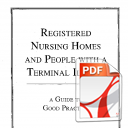
Registered Nursing Homes and People with a Terminal Illness (November 1994)
Report of a Working Group of the Scottish Partnership Agency for Palliative and Cancer Care - a guide to good practice including recommedations about meeting individual needs, managemant and philosophy of care, accommodation, furniture and equipment, staffing, drugs and therapy, suggestions and complaints, and death and bereavement. ISBN: 0-9524864-0-7

Palliative Cancer Care Guidelines (January 1994)
Drafted jointly by the Scottish Partnership Agency and the Clinical Resource Audit Group, these guidelines on Palliative Cancer Care aim to facilitate the provision of palliative care to make it available to all who need it throughout Scotland. The guidelines focus mainly on palliative care for cancer patients, recognising that 1 in 3 people in the Scottish population will develop cancer at some point in their life and 1 in 4 will die from cancer. ISBN: no ISBN

Care in the Community for Cancer Patients - a second briefing paper (August 1992)
This briefing paper was designed for those whose tasks include the assessment of need and the management of care for cancer patients. It outlines the prevalence and incidence of cancer with in NHS Board areas, and provides a list of some of the special characteristics of the needs of this client group. It also includes four short case studies showing the care of cancer patients in the community from different professional perspectives. ISBN: no ISBN

Relief of Pain and Related Symptoms: The Role of Drug Therapy
This publication has now been withdrawn from further circulation. The content had become out of date, and the need for a national booklet has been superceded by the development of local palliative care guidelines in individual NHS Board areas. Please refer to your NHS Board or your nearest Specialist Palliative Care Unit for advice - you will find details of these on this website. ISBN: no ISBN
